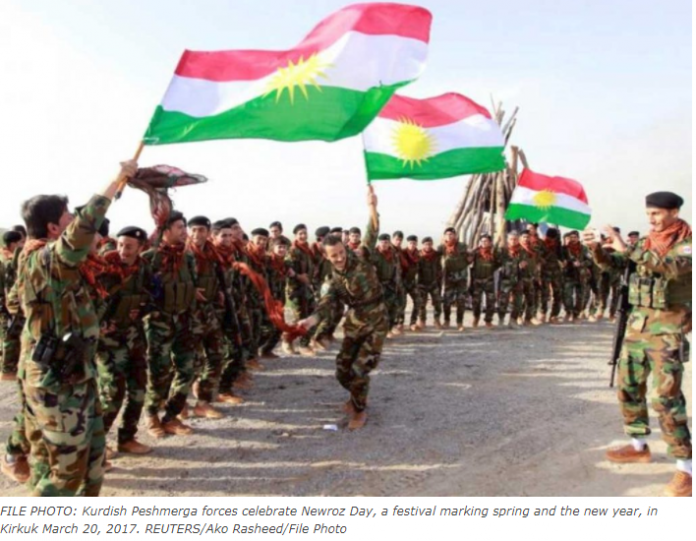May 23, 2017
By Phil Stewart
WASHINGTON (Reuters) – An Iraqi Kurdish push for independence from Baghdad appears likely to be a question of “not if but when,” in a significant challenge to Iraq’s stability, the head of the U.S. Defense Intelligence Agency said on Tuesday.
Iraq’s main Kurdish parties announced in April a plan to hold a referendum on independence this year, after the defeat of Islamic State militants.
The DIA’s director, Lieutenant General Vincent Stewart, told a Senate hearing that the ability of Iraq’s Kurds to reach an understanding with the Shi’ite-dominated government in Baghdad would be essential to avoid renewed conflict.
“Kurdish independence is on a trajectory where it is probably not if but when. And it will complicate the situation unless there’s an agreement in Baghdad,” said Stewart, whose role is to provide intelligence assessments and not to craft U.S. policy.
“So this a significant referendum that comes up in October this year.”
The Kurds have played a major role in the U.S.-backed campaign to defeat Islamic State, the ultra-hard-line Sunni Muslim group that overran about a third of Iraq nearly three years ago.
The militants are now fighting off Iraqi forces in Mosul, their last major urban stronghold in Iraq from where they declared a “caliphate” that also includes parts of Syria.
While the fall of Mosul would effectively end the “caliphate,” it will not solve deep divisions over power, land and resources between Iraq’s Shi’ite Arab majority and the important Sunni Arab and Kurdish communities.
“Once ISIS is defeated in Mosul, the greatest challenge to the Iraqi government is to reconcile the differences between the Shia-dominated government, the Sunnis out west and the Kurds to the north,” Stewart said.
The Iraqi Kurds have their own armed forces, the Peshmerga, which in 2014 prevented Islamic State from capturing the oil region of Kirkuk, after the Iraqi army fled in the face of the militants.
The Kurds have historical claims over Kirkuk, which is also inhabited by Turkmen and Arabs. Hard-line Iranian-backed Iraqi Shi’ite militias have threatened to expel the Kurds by force from this region and other disputed areas.
“Resolving the Kirkuk oil field and the revenues associated with the oil fields, resolving the ownership of the city of Kirkuk, will be significant political challenges for the Iraqi government,” Stewart said.
He warned of dire consequences should Baghdad be unable or unwilling to reach an understanding with the Kurds or the Sunnis.
“Failure to address those challenges, coming up with a political solution, will ultimately result in conflict among all of the parties to resolve this and going back to what could devolve into a civil strife in Iraq,” he said.
Iraqi Kurdish independence has been historically opposed by Iraq and its neighbors, Iran, Turkey and Syria, which fear similar aspirations by their own Kurdish populations.


